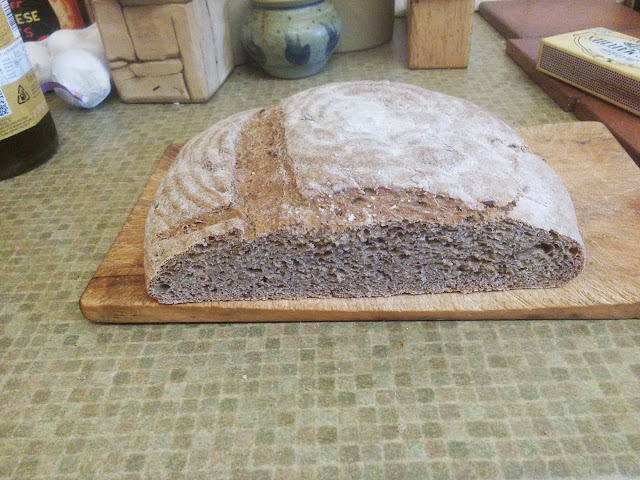State of the art bâtard, 23 June 2017
The loaves we made at the Heron Corn Mill today all turned out looking pretty good.
It's very nice to find that they really do look remarkably similar to what a bâtard is supposed to look like -
This tea towel was posted on a discussion board to disprove one contributor's claim that there was no such bread as a "bâtard". Point made, I think!
Our loaves look like "complete bastards" on the tea towel, but it should be noted that the French word for wholemeal is "complet".
Over the last couple of years at Bread of Heron, the Heron Corn Mill community bread group, we've tried making several of these different types of French loaves. Here are some of our efforts.
Prototype bâtard, 25 September 2015
I think it's fair to say that has improved in the last two years!
One roll short of a Marguerite, 24 June 2016
I like to think of this as a Polo mint - the Marguerite with a hole. But it is another way of making a couronne.
All around my hat with a fruit couronne, 25 September 2015
There were some pretty good couronnes back in those days. The one in the middle is mine. The rest of the group did a lot better on this than me!
Back in March 2012 I was still having trouble deciding how to slash a couronne -
This was what I thought might work in September 2011 -
The criss-cross slash on the loaf above the couronne here is often used on a classic pain de campagne. This often turns up in my early bread photos. Here's one from 2013 -
There have also been fougasses, genuine pains de campagne (with levain), and various pains aux céréales - including today's rather wonderful gloopy wholegrain wholemeal.
Vive la France!
Shakespeare on bastards
King Lear ACT I SCENE II. The Earl of Gloucester's castle.
SCENE II. The Earl of Gloucester's castle.
Enter EDMUND, with a letter
EDMUND
Thou, nature, art my goddess; to thy lawMy services are bound. Wherefore should IStand in the plague of custom, and permitThe curiosity of nations to deprive me,For that I am some twelve or fourteen moon-shinesLag of a brother? Why bastard? wherefore base?When my dimensions are as well compact,My mind as generous, and my shape as true,As honest madam's issue? Why brand they usWith base? with baseness? bastardy? base, base?Who, in the lusty stealth of nature, takeMore composition and fierce qualityThan doth, within a dull, stale, tired bed,Go to the creating a whole tribe of fops,Got 'tween asleep and wake? Well, then,Legitimate Edgar, I must have your land:Our father's love is to the bastard EdmundAs to the legitimate: fine word,--legitimate!Well, my legitimate, if this letter speed,And my invention thrive, Edmund the baseShall top the legitimate. I grow; I prosper:Now, gods, stand up for bâtards,Especially complete ones!










No comments:
Post a Comment